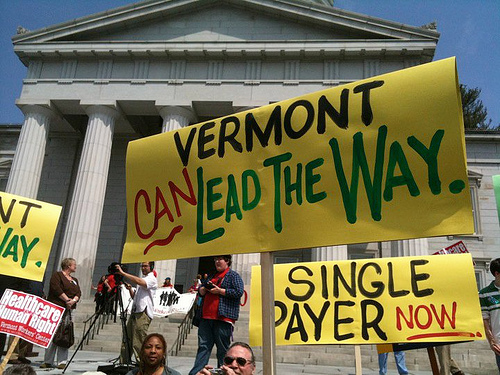Freitag, 2. Dezember 2011
Treating A Scorpion Sting: $ 100 In Mexico, $ 12,000 In U.S.
trickymaster, 00:35h

Kaiser Health News, November 28, 2011
"Say you’re trekking through the desert in Mexico, minding your own business, when all of a sudden a scorpion scrambles up your boot and stings your leg. You hobble over to a nearby clinic, where you’re given a dose of anti-venom that brings you fast relief. The charge for the serum is about $100.
Now imagine instead that you happen to be hiking in Arizona, and the same type of scorpion stings you. You make it to the emergency room, where the charge for a dose of the same anti-venom costs can cost as much as $12,000, according to a survey by The Arizona Republic. Since patients need three to five doses, the cost can reach about $50,000.
The drug, called Anascorp, has been available for years in Mexico, but was just given FDA approval in August for the U.S. market. Anascorp is designed to treat the sting of the Bark Scorpion, a particularly poisonous species."
Source: http://capsules.kaiserhealthnews.org/index.php/2011/11/treating-a-scorpion-sting-12000-in-u-s/
Now why does the same drug cost 120x in the United States? It's because our system is absolutely broken. Every person, group or company adds an additional fee to the drug to reap off the benefits. The nurses want money, the doctors want something, the insurance wants a bite, the drug delivery wants something too, and so on. Anyone saying that this health care mess is working perfectly fine, needs serious help.
The high price will not only discourage people to take this drug when they need it, it also reduces sales discouraging the drug manufacturer to do further research finding cures for other venoms. The same drug landing in the single payer health-care system of Canada will probably cost slightly higher than in Mexico due to importing costs. Yet another reason why we need a fully revamped universal health care system, not the mess they passed back in 2010.
... link (0 Kommentare) ... comment
Freitag, 20. Mai 2011
Why is health care so expensive in America?
trickymaster, 14:42h
Two parts of a very insightful series of why health care is so expensive in the United States. It has also something to do with how people live their lives.
... link (0 Kommentare) ... comment
Sonntag, 8. Mai 2011
Health care updates May 2011: Huge changes!
trickymaster, 02:38h

"Florida Legislators Pass H.M.O. Plan for Medicaid
If signed into law as expected, the bill will make Florida, with one of the largest number of Medicaid patients and a high rate of uninsured, one of the biggest states to jump almost entirely from a traditional Medicaid payment system into managed care. The wholesale shift would begin in July 2012. The bill, a compromise between the House and the Senate versions, would allow the state to decide how much to spend on Medicaid each year, share in the profits of managed-care companies if they exceed 5 percent and penalize networks that reneged on contracts (Alvarez, 5/6)."
Source: http://www.nytimes.com/2011/05/07/us/07florida.html?_r=1
"As soon as 2017, Vermont could become the first state to provide and pay for insurance for most of its residents under a plan passed by the Legislature Thursday. But it must first clear several significant hurdles, including persuading the federal government to allow the state to assume responsibility for Medicare and Medicaid enrollees and finding a way to pay for the program. The bill outlines a planning process for implementing what is often referred to as a “single-payer’’ system (Conaboy, 5/7)."
Source: http://www.burlingtonfreepress.com/article/20110505/NEWS03/110505022/Health-care-reform-bill-way-governor
"Hawaii's New Medicaid Plan Is Aimed At Improving Care
State officials unveiled yesterday a new way of providing and coordinating health care for Medicaid patients, particularly the chronically ill, starting in January. Called "medical home model," the program integrates primary health care, behavioral care and social services for Medicaid recipients ... A key component is an electronic health records system to allow easy access to a patient's medical records wherever the patient goes in Hawaii. One in 5 Hawaii residents is a Medicaid recipient, state officials said (Fujimori, 5/7)."
Source: http://www.staradvertiser.com/news/hawaiinews/20110507__States_new_Medicaid_plan_is_aimed_at_improving_care.html
"Maine. A bill that proposes overhauling the state's health insurance regulations moves to the Senate after narrowly passing in the House. The House yesterday voted 76-72 in favor of LD 1333, which would allow out-of-state insurers to sell health care insurance in Maine and allow insurers to vary premium ratings based on factors such as geographic area and age ... Democrats pushed against the bill, arguing it would increase premiums for older residents and those in rural areas, and said the process was rushed, according to the paper (5/6)."
Source: http://www.mainebiz.biz/news47904.html

By Rick Ungar
"How much of an increase?
Accordingly to the CBO estimates, the program would result in seniors paying twice as much for their care – a sum that would total more than $12,510 a year.
Here’s how the CBO sees it going –
The GOP proposal, which would begin in 2022, involves providing a ‘voucher’ – or as Ryan likes to call it, ‘premium support’ – to seniors to help pay for their health insurance. The average American would receive a check for $8,000, representing roughly what the CBO estimates Medicare would have to fork out for the average beneficiary in 2022. In addition to the government’s costs, the CBO estimates that seniors, in 2022, would lay out about $6,150.00 in out-of-pocket costs in the Medicare system. That totals an average cost of health care for participating seniors, in 2022, to be $14,770.
Under the GOP privatization plan, the cost to purchase the health insurance policy would cost about $20,520 per year – leaving the seniors out of pocket in the amount of $12,510 or more than twice what they would pay in 2022 should the Medicare system we currently have continue."
Source: http://blogs.forbes.com/rickungar/2011/04/07/cbo-says-gop-medicare-plan-would-double-the-cost-of-health-care-for-seniors/

By Walter Heath
"The following non-binding ballot question was asked of 220,865 Massachusetts voters in the November, 2010 general election: “Should the state representative from this district be instructed to support legislation establishing health care as a human right regardless of age, state of health, or employment status, by creating a single payer health insurance system like Medicare that is comprehensive, cost effective, and publicly provided to all residents of Massachusetts?”
192,230 Massachusetts voters (87%) voted on the question, a fact which speaks volumes about continuing interest in this issue. Sixty-two percent of voters (119,275) instructed their state representative to support a single-payer health insurance system such as Medicare. The voters polled constitute a random cross-section of Massachusetts life: rural, small town, suburban and urban."
Source: http://californiaonecare.org/majority-of-massachusetts-voters-prefer-single-payer/

May 5th, 2011 by Sylvia Moore
"Facing possible extinction for the first time in four years, the single payer bill SB 810 pulled through, passing the Senate Health Committee on Wednesday on a 5-3 vote, state Sen. Mark Leno’s office reported. Up until a couple of days ago, committee chair Sen. Ed Hernandez had been undecided, putting the bill in jeopardy. But intense pressure from single payer advocates across the state and a massive phone campaign finally secured a “yes” vote from Hernandez. In addition, hundreds of single payer supporters descended upon the Capitol in Sacramento to attend the hearing.
THANKS TO ALL who called Hernandez to change his mind!
SB 810 will now move forward to the Senate Appropriations Committee. It’s imperative that we keep calling and writing our legislators so we can get the bill through the entire Senate a fourth time, then on to the Assembly, and finally to Gov. Jerry Brown’s desk. Along with Vermont – which is poised to pass its own single payer bill – we have the chance to show the rest of the country that single payer works, and is the best and most fiscally responsible way to solve our healthcare crisis. Full care for all, for less!"
To find your state Senator, click on this link.
http://senate.ca.gov/
To find your Assemblymember, click this link.
http://www.assembly.ca.gov/defaulttext.asp
... link (0 Kommentare) ... comment
Sonntag, 1. Mai 2011
Mass Dems strip public unions of bargaining rights on health insurance!
trickymaster, 01:49h

That's precisely the same action taken by Republicans in Wisconsin, where it sparked a massive democratic outcry and weeks of rowdy protests.
The Massachusetts legislation would allow local municipalities to make unilateral changes to agreed-upon benefits, like health care, bypassing the need for union approval."
Source: http://www.rawstory.com/rs/2011/04/29/massachusetts-dems-vote-to-strip-public-unions-of-bargaining-rights/
So instead of passing a single payer health-care bill that would halve the cost of care while covering everyone and thus save the state hundreds of billions, they decide to go the super-dumb way: Do what Republicans do. That is stripping of their bargaining rights on health insurance.
What a massively stupid move in a time when Democrats could really benefit from taking distance from Republican standpoints. This is why the Democratic Party gets ridiculed. They promise and come up with the best ideas when they are in the oppositions. But once they run legislature, they are almost exactly like the ones they oppose.
Also:
"According to The Associated Press, the budget also cuts $800 million from the state's Medicaid-like program MassHealth, and strips more than $65 million in aid to state agencies and municipalities."
Source: http://www.boston.com/news/local/massachusetts/articles/2011/04/28/mass_house_approves_304b_state_budget_proposal/
Again. Incredibly stupid decision making because politicians feat that the single payer health-care system could be too successful.
Maybe the unions will realize that both parties sold out and form a new Labor Party. Well that requires that those union voters begin to boycott hypocrites instead of following them like stupid lemmings. Look what it did in Vermont where we have the Vermont Progressive Party. They will soon have single payer health care.
... link (0 Kommentare) ... comment
Sonntag, 17. April 2011
Vermont health bill mislabeled ‘single payer’ says PNHP.
trickymaster, 22:57h

"We support Vermont’s effort to bring relief from physical and financial suffering for its residents. We encourage Vermont to move forward with policies that would bring them as close as possible to a single payer system. We encourage the people of Vermont and of the entire nation to elect individuals who will enact the federal legislation that would ensure health care justice for all – a single payer national health program.
Why did the PNHP board believe that we had to make a statement on the deficiencies of the Vermont effort? It is simply because the citizens of our nation are not keeping their eyes on the ball. Supporters of reform have been distracted by efforts to try to made ACA [Affordable Care Act = federal Health Care Reform] work, and by state-level efforts to try to get us closer to single payer. The ball we need to watch is comprehensive affordable care for everyone through true single payer reform. All of us must direct our attention and efforts to that above all else, even though we should continue to support state efforts in the interim that would provide some temporary relief before we can get to the national health program that we need."
Source: http://www.pnhp.org/news/2011/april/vermont-health-bill-mislabeled-single-payer-doctors-group
Indeed, taking a closer look at the Vermont House health care bill (H.202), not much is left from the original single payer health-care concept. There is no mention of delivery and reimbursement which is so important to single payer. Instead, you will find sections that tolerate the presence of private insurers which is outrageous! Right? There is no way Vermont can save as long as private insurers reap all the benefits.
However, what PNHP fails to mention is that the government of Vermont said that this is only one of many bills that will path the way to true single payer health care. There are hundreds of local, state and federal health programs that need to be restructured or united before one can switch from the public-private mess to a well-functioning universal health care system. I recommend reading the summary of the bill, the Q&A and the article "SHUMLIN’S BILL: The Glass Is Half Full by Ethan Parkeon" (Link below) on the site Vermont for Single Payer. Vermont is the most progressive state in the union and they have laid out the plan. Single payer health care will be law of the land by 2017 or 2014 when Congress manages to pass a state waiver.
SHUMLIN’S BILL: The Glass Is Half Full:
http://vermontforsinglepayer.org/blog/2011/03/shumlins-bill-the-glass-is-half-full/
... link (0 Kommentare) ... comment
Sonntag, 13. März 2011
Why California needs single payer health-care!
trickymaster, 15:50h

On top of that:
"Working families are being gouged to the point of having to drop their already woefully inadequate coverage. Coverage so bad and so bare bones that it usually carries a deductible of $5000-$10,000. For Blue Shield customers who buy their own insurance, the likely rate hikes will be the third since October, amounting to up to 59 percent in some cases."
www.californiaonecare.org
The first thing we have to do is drive all private insurers out of business and establish a single payer health-care system like the one that Vermont is working on, with the difference that our single payer health-care system must include people enrolled in Medicaid and Medicare.
Many people don't know:
California has been trying to pass a single payer bill TWICE (2006 and 2008). Both only failed because Schwarzenegger, a Republican, vetoed the bills. This time, all Jerry Brown needs to do is to sign the bill. Single payer health-care would:
-Cover all California residents
-No deductibles
-Cover at least 90% of all health care costs
-Be self-sufficient and independent from the government
-And HALF the cost.
Where is the evidence for the savings? Take a look at any country with single payer:
Per capita expenditure on health (USD):
Canada (state-wide single payer): $3,895
Australia (nation-wide single payer): $3,137
Japan (nation-wide single payer): $2,581
Countries with other universal health care systems:
UK (socialized medicine): $2,992
Norway (Hybrid between socialized and single payer): $3,601
Germany (Multi-payer health care): $3,588
Norway (Hybrid): $5,910 (HOWEVER, it's completely free of charge!)
Now compare that to the United States: $7,290
http://en.wikipedia.org/wiki/Health_care_systems#Cross-country_comparisons

On top of that, their health care costs are rising at a slower rate than ours. Now I want to debunk some of the main points that Rethugs and Teabaggers make. I lived in Europe for most of my life.
But they ration health care and you end up staying in lines.
NO. There is no rationing. In fact, I have never seen any rationing that comes even close to what I see in the US health insurance industry. There are no lines in hospital.
But the government will choose your doctor.
NO. You can choose any doctor, dentist, specialist, hospital you want at any time. You pay the same co-pay (0-10 euros in Germany per quarter). When you're under 18, all you have to do is show your health insurance card, that's it. Since 2005, you can use your European Health Insurance Card in any EU member states, Switzerland, Iceland, and Norway saving your a lot of paper work and bad surprises.
But their system is completely unsustainable and will collapse.
NO. In fact, the health care budget is one of the best balanced budgets in European countries thanks to the ability to drive down costs. The health care system acts independently from the government, state-owned rather than state-run. There is a difference.
Help us to revive the single payer bill in California. For more information:
http://californiaonecare.org/
... link (0 Kommentare) ... comment
Montag, 3. Januar 2011
Health care updates for New Year 2011.
trickymaster, 17:18h

Meanwhile, in Vermont the first draft for a single payer health care system will be submitted on January 19th to the legislature, followed by a 15 day public comment period.
All proposals must meet the following criteria defined in the bill:
- Universal access and coverage for all essential health services for all Vermonters
- A transparent, efficient and accountable system
- Free choice of providers for all Vermonters
- A system of containing costs
- A financing mechanism that is “sufficient, fair, sustainable and shared equitably.
I'm more than happy that Vermont is on the right track. Once their system is up and running, people will realize how government-run health care provides superior services for less.
Source: What comes next for single payer in Vermont?

"The percentage of Americans younger than 65 who receive health insurance through their employer has fallen below 60% not only because of high unemployment. It's also because many of those who remained on the job saw their coverage eliminated or reduced, or dropped it themselves because their plan became too expensive.
The conclusions come from separate reports issued by the Economic Policy Institute and the Commonwealth Fund. The organizations each released a report in November and December on the cost and prevalence of employee coverage.
[...]
On Dec. 15, the institute put out another report noting that those who did have insurance were paying more for it. It said family health insurance premiums rose by 131% between 1999 and 2009 -- a rate far outstripping the 38.1% rise in average hourly earnings for nonmanagement employees and the 28.8% overall inflation rate."
http://www.ama-assn.org/amednews/2010/12/27/bil11227.htm
This is why I don't understand why labor unions are so vehemently defending employer-based health care. Just a few have access to cadillac health insurance plans (very generous health plans with no co-pay) and the numbers are decreasing.
It's for this reason why civilized countries simply tax all employees and employers. The money goes directly to a single fund that provides coverage for all citizens and residents.
It would take only a few amendments to turn the current health reform bill into such a much better system that even President Obama had in mind:
We need to discourage employer-based coverage so that all people purchase health care through the Exchanges. The money that pays for the subsidies would come directly from employers through a separate tax. Since the cost is spread to all employers, the cost of health care would lower for large and small employers as well as employees.
Then, you only need to add some new powers to the government (negotiating drug prices, pay-as-you-go instead of fee-for-service, power to lower premiums etc.) and you would have a much better, more affordable universal health care system. The question is, when are our politicians going to wake up and take real action?

By Elise Foley
Huffington Post
"Just before leaving town for Christmas, senators reached a deal to ensure Republican support for the bill. It will now go for a vote by unanimous consent. The House remained in Washington to act on the bill.
The new deal reduces the cost of the bill by $6.2 billion from its previous Senate version and $7.5 billion from the version that passed the House, according to a statement from Coburn's office. It calls for closing the Victims Compensation Fund in 2016 instead of 2031, preventing claimants from pursuing civil lawsuits if rejected from the fund, and limiting infrastructure costs and attorney fees."
Source: http://www.huffingtonpost.com/2010/12/22/911-first-responders-heal_1_n_800326.html
I commented on Republican obstruction towards the 9/11 Responder bill on July 30, 2010. On one side, I'm more than happy that it finally passed. On the other hand, it's a very bitter pill. Our heroes fought for this for 9 years. Now they only get 5 years of benefits for the chronic illnesses caused by toxins?
The solution would have been more than simple. One only has to take a look at PPACA. In the bill, a provision allows residents of Libby, Montana, who have been exposed to asbestos for years to enroll into Medicare. A few hundred heroes would NOT have broken the bank, especially since they would still pay the Medicare premiums. It's a perfectly rational solution for providing affordable long-term coverage.
I can only wonder why Congress did not add 9/11 heroes to this provision.
... link (0 Kommentare) ... comment
Sonntag, 28. November 2010
Single payer health care in Vermont and California delayed?
trickymaster, 13:35h

Source: http://www.pnhp.org/news/2010/november/single-payer-system-takes-center-stage-in-vermont
However, the Affordable Care passed on federal level would delay efforts by Vermont and soon California to 2017! The Congressional Budget Office was worried that states could play out the system to receive more money.
Source: http://voices.washingtonpost.com/ezra-klein/2010/11/sen_bernie_sanders_vermont_sta.html
California has passed single payer health care legislation twice in 2006 and 2008 only to face a veto by Republican Governor Schwarzenegger. I'm more than worried about the new Governor Jerry Brown who promised not to increase taxes. However, one needs to increase taxes to pay for the single payer health-care system. In exchange, there are no premiums, deductibles and only a $10 to no co-payment.
Dr. Hsiao will be responsible for designing the three proposals that will fit to Vermont. He also designed the single payer health care system of Taiwan. In case you don't know, the Taiwanese health care system is famous for using the best of all health care systems. The result is the lowest administrative cost in the world (less than 2%) while having a state-of-the-art health care system. It is also one of the most efficient and most comprehensive systems. Yes, this guy will design America's second single payer health-care system and it will be perfect on day one.
Links:
Health-care system in Taiwan.
... link (0 Kommentare) ... comment
Dienstag, 7. September 2010
Up to $10 billion in fines from PacificCare for corporate greed.
trickymaster, 23:55h

In court filings and other documents, the California Department of Insurance says PacifiCare violated state law nearly 1 million times from 2006 to 2008 after it was purchased by UnitedHealth Group Inc., the nation's largest health insurance company by revenue."
Source: http://www.latimes.com/business/la-fi-pacificare-unitedhealth-20100908,0,6380098.story
This is the perfect proof to show that a privatized health insurance system is far from working smoother or more efficient than government health care. In fact, I have never heard of such a thing in a coutnry with a government-run unviersal health care system. I just hope that the California government will demand the whole fine.
... link
Montag, 16. August 2010
The 4 major health care systems you need to know!
trickymaster, 19:40h

Reporter T. R. Reid explains the differences between the four main models of health care systems: Beveridge, Bismarck, National Health Insurance and Out of Pocket.
Beveridge is basically socialized medicine, where the government both pays for care and employs the providers. The most well-known example is Britain’s National Health Service.
In a Bismarckian system, employers provide health insurance, and costs are shared between employer and employee. Insurance plans are private and/or public. Germany, the Netherlands and Switzerland have the Bismarck model.
The National Health Insurance model is single payer, in which the government pays for all healthcare costs through taxation, and the providers remain in the private sphere. Canada, Australia, Taiwan and South Korea have single payer systems.
The Out of Pocket model is basically what Third World countries have – if you’re lucky enough to see a doctor, you may have to pay an entire year’s salary for the treatment.
Reid points out that the United States has all four models. If you’re a veteran, he says, you live in Britain. If you’re employed, you’re in Germany. If you’re 65 and over, Canada. But if you’re uninsured, Afghanistan. The difference between America and the rest of the other industrialized countries, Reid says, is that the other countries have decided on one system for all their citizens.
This is a very insightful article and video about the different universal health care systems that I recommend to anyone who wants to know about the options to reduce our health care spending while we increase the quality of care and expand it to all citizens, residents and even non-residents.
Source: http://californiaonecare.org/reporter-t-r-reid-shows-america-how-the-world-does-health-care/
... link
... nächste Seite

